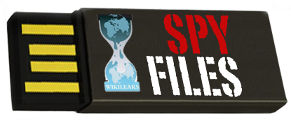 Vor etwas über einem Jahr hat WikiLeaks die dritte Ausgabe der „Spy Files“ veröffentlicht, also Dokumente zu Geheimdienst-Auftragsfirmen und Überwachungstechnologien. Alice Corona hat für Silk.co die 559 geleakten Dokumente nun aufbereitet: WikiLeaks Spy Files – The interactive searchable database
Vor etwas über einem Jahr hat WikiLeaks die dritte Ausgabe der „Spy Files“ veröffentlicht, also Dokumente zu Geheimdienst-Auftragsfirmen und Überwachungstechnologien. Alice Corona hat für Silk.co die 559 geleakten Dokumente nun aufbereitet: WikiLeaks Spy Files – The interactive searchable database
Currently, there are 559 leaked company documents, and 15 location tracking reports from WikiLeaks Counter Intelligence Unit (WLCIU). The 559 files disclose to the public internal documents from more than 100 companies specialized in intelligence and (mass) surveillance technologies. These technologies are sold both to Western governments and to dictators, and have been used by the Syrian government. The 15 documents from WLCIU reveal the timestamps and locations of 20 members of these companies, whose whereabouts WikiLeaks has decided to track in order to show where the main surveillance contractors are sending its people. But what does the Spy Files database actually contain? Which are the most recurring intelligence companies and what systems do they target? How to download exactly the leaked document your research calls for? To answer these questions, we’ve decided to import WikiLeaks’s DB into Silk, to combine it with semantic technologies, a powerful query engine and a user-friendly interactive visualization interface.
You can now:
- Search through all leaked documents, companies and subjects tracked by WLCIU from filterable tables, clicking on each one for its specific facts and visualizations.
- Create maps and charts to visualize, explore and share interesting statistics and views from the database. All it takes is a few clicks to choose a type of graph and decide which variables to plot, which filters to apply and how to sort the data. Click „Explore“ next to the following visualizations to get started and customize them as you wish.




0 Ergänzungen
Dieser Artikel ist älter als ein Jahr, daher sind die Ergänzungen geschlossen.